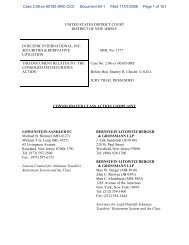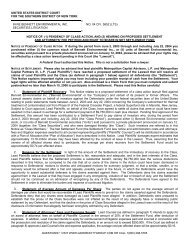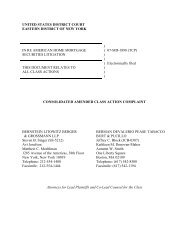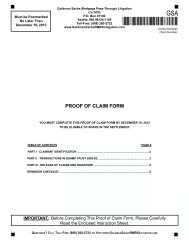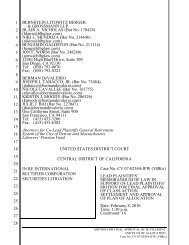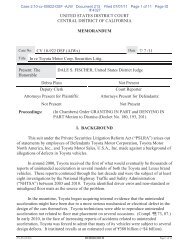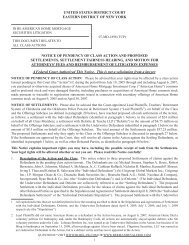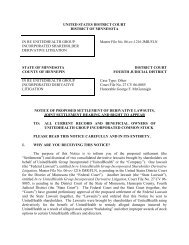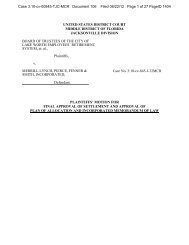to view the Lawdragon's - Bernstein Litowitz Berger & Grossmann LLP
to view the Lawdragon's - Bernstein Litowitz Berger & Grossmann LLP
to view the Lawdragon's - Bernstein Litowitz Berger & Grossmann LLP
You also want an ePaper? Increase the reach of your titles
YUMPU automatically turns print PDFs into web optimized ePapers that Google loves.
500Lawdragon Q & A with:Kim AskewKim Askew’s recognition in our Guide<strong>to</strong> World-Class Employment Lawyers, published in partnershipwith Human Resource Executive, as well as inour 2011 Lawdragon 500 Leading Lawyers in America,are just a few recent bullet points in what is undoubtedlyone of <strong>the</strong> most award-laden careers of litiga<strong>to</strong>rsin her generation.Recent recognitions also include <strong>the</strong> Dallas BarAssociation’s Martin Lu<strong>the</strong>r King, Jr. Justice Award, in2010, and her placement on Texas Lawyer’s list of <strong>the</strong>25 Greatest Texas Lawyers of <strong>the</strong> Past Quarter Century,also awarded in 2010. In 2012 Askew received <strong>the</strong>State Bar of Texas Section of Litigation’s Lu<strong>the</strong>r (Luke)Soles III Award.Though she is a force in <strong>the</strong> employment arena, <strong>the</strong>K&L Gates partner handles a range of high-stakes commercialdisputes for her clients, including manyFortune 500 companies. She has also been extremelyactive in professional associations and was <strong>the</strong> firstperson of color <strong>to</strong> serve as chair of <strong>the</strong> Section ofLitigation of <strong>the</strong> American Bar Association.LAWDRAGon: Can you tell our readers why you wanted<strong>to</strong> become a lawyer?KIM ASKEW: My role models were <strong>the</strong> lawyers whohelped our community during <strong>the</strong> civil rights strugglesof <strong>the</strong> early ‘70s in Savannah, Georgia, where I grewup. As our community confronted issues with busingand <strong>the</strong> desegregation of schools and neighborhoods, Iwitnessed <strong>the</strong> leadership of local minority lawyers.Many of <strong>the</strong>se lawyers were great ora<strong>to</strong>rs. Theyexplained rights and opportunities in ways that empoweredpeople and made <strong>the</strong>m less fearful.I did not always understand what was going on, but<strong>the</strong>y absolutely mesmerized me. As I reflect on <strong>the</strong>skills <strong>the</strong>y so ably demonstrated in churches and socialhalls, I can only imagine what <strong>the</strong>y were like beforejuries. I knew <strong>the</strong>n that I would be a lawyer. I did notsee any women lawyers in those days, but I decided Iwould change that as well.LD: Much has been written about how challenging it isfor women and minorities <strong>to</strong> enter in<strong>to</strong> what have beenwhite-male dominated partnerships. It remains challengingof course, but it was even less common in priordecades.KA: You are right. It is still a challenge, but I ampleased <strong>to</strong> see more successful lawyers of color. Ispent twenty-four years of my practice at Hughes &Luce, <strong>LLP</strong>, which merged in<strong>to</strong> K&L Gates in 2008. LikebY John rYanmany great firms, it had a stellar client list, interestingwork, and opportunities for advancement, but <strong>the</strong> firmwas unique in some ways.First, <strong>the</strong> firm valued lawyers as individuals andunders<strong>to</strong>od that I wanted <strong>to</strong> be a lawyer and a leader in<strong>the</strong> bar and community. I was able <strong>to</strong> chart <strong>the</strong> career Iwanted, not <strong>the</strong> one someone else wanted for me. Raceand gender were never issues in <strong>the</strong> firm. When I confronted<strong>the</strong>m in <strong>the</strong> practice, <strong>the</strong> firm always s<strong>to</strong>od up<strong>to</strong> opposing counsel and, when necessary, a judge ortwo. I wanted an equal playing field and I got it.Second, <strong>the</strong> firm promoted clients above all else. Itexposed young lawyers <strong>to</strong> clients and inculcated <strong>the</strong>bedrock principal that lawyers had <strong>to</strong> truly understand<strong>the</strong> client’s business and legal problems. We prided ourselveson client service, novel approaches <strong>to</strong> practice,and out-of-<strong>the</strong> box thinking. That belief in <strong>the</strong> clientencouraged <strong>the</strong> practice of great law over <strong>the</strong> years.Third, I unders<strong>to</strong>od <strong>the</strong> importance of businessdevelopment and co-chaired business developmentactivities for <strong>the</strong> firm early on as a partner.Finally, men<strong>to</strong>rs made a difference. Skilled lawyersand judges offered guidance <strong>to</strong> me throughout mycareer and <strong>the</strong>y still do. Of course, I have become amen<strong>to</strong>r <strong>to</strong> many because men<strong>to</strong>ring certainly helpedme. The support and opportunities provided by men<strong>to</strong>rscan make or break a career.LD: To what do you explain your success in <strong>the</strong> courtroomover such a long list of cases?KA: Cases, clients, legal <strong>the</strong>ories, and courtroom practicemay change, but <strong>the</strong> fundamentals of success in acourtroom do not. It is always all about <strong>the</strong> people. Irelate <strong>to</strong> people. Whe<strong>the</strong>r a judge or jury, it is alwaysabout relating <strong>to</strong> and persuading <strong>the</strong> trier of fact as <strong>to</strong>why your client should win.LD: What key lesson or lessons do you try <strong>to</strong> instill inyounger litiga<strong>to</strong>rs who look <strong>to</strong> you as a role model?KA: Number one, be prepared, be prepared, be prepared!Second, know your case inside and out – all<strong>the</strong> details and <strong>the</strong> strengths and weaknesses ofevery <strong>the</strong>ory and every aspect of <strong>the</strong> case. Moreimportantly, understand <strong>the</strong> opposing side’s case betterthan your opposition. Third, be a good s<strong>to</strong>ryteller.Learn <strong>to</strong> simplify <strong>the</strong> most complex cases in ways thateveryday jurors can understand. And finally, winninglawyers are au<strong>the</strong>ntic before juries. They are comfortablein <strong>the</strong>ir own skins. They trust juries.See <strong>the</strong> full Q&A at www.lawdragon.com/lawyer-limelights/kim-askew.L A W D R A G O N 60 I s s u e 13Pho<strong>to</strong> by: Justin Clemons



